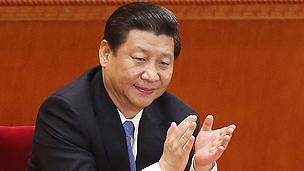China profile - Leaders
- Published
President: Xi Jinping

President Xi Jinping has a reputation for fighting corruption
Xi Jinping came to power in 2012-3 as the hand-picked heir of predecessor Hu Jintao, and is expected to lead China for the next decade.
Since taking over, he has concentrated power in his hands, in a turn away from the system of collective leadership in place since the death of state founder Mao Zedong.
This was made official in 2017, when the Communist Party enshrined Xi's name and ideology in its constitution, thereby elevating him to the same level as Mao.
The main themes of his leadership have been a fight against corruption and economic reform.
Aside from boosting his popularity, the anti-graft campaign has claimed several potential heavyweight party rivals of Mr Xi, strengthening his political dominance.
It has also coincided with a move to silence voices critical of one-party rule, especially on social media.
This, along with a rejection of Western ideas of constitutional democracy and human rights in a party document leaked in 2013, as well as the promotion of party hard-liners, suggest political liberalisation is not on Mr Xi's agenda.
On the economy, in contrast, he is thought to be seeking to reform it by exposing it more to market forces, although he has to balance this with expectations of slower economic growth.
He has also presented a more modern face to China and the world, with his direct manner of speaking and glamorous former folk-singer wife.
Elite background
Mr Xi is the first politician born under Communist rule to lead China, and represents the fifth generation of party chiefs.
He is the son of Communist grandee Xi Zhongxun, who was purged during the Cultural Revolution but went on to pioneer economic and social reform in Guandong Province after the death of Chairman Mao.
Like his father, Xi Jinping earned a reputation for fighting corruption, promoting economic development and keeping the party's firm grip on the levers of power as party chief in Fujian and Zheijiang Provinces and then in Shanghai.
Mr Xi became Mr Hu's vice-president and heir-apparent in 2008.
He took over as general secretary of the Communist Party of China at the party congress in November 2012, as chairman of the important Central Military Commission and then as head of state in March 2013.
- Published8 October 2012